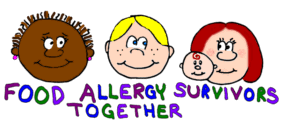|
|
Students Doing Research
Introduction
School is a great place to share about your food allergies and spread awareness. Research projects and reports can often be used as a means of spreading the word. Throughout school I often found it easy to come up with topics for projects, just thinking about my food allergies! I bet you will, too. You can read a sample essay that a student shared with FAST members.
"Food Allergies: An Invisible Disorder" was written by Kelsey McNitt when she was a senior in high school.
Please feel free to e-mail me. I will try to help you, although I can't guarantee it (example: I'm not very good with statistics!). Be sure that you give me a valid e-mail address! Many times students give me an invalid school address that I can't reply to!
Thanks for doing your report about food allergies!
If you aren't already familiar with them, I'm sure
that you will find them a very interesting topic.
If you have food allergies and are doing this report in an effort to educate your classmates, friends, and teacher, pat yourself on the back for your effort at informing more people about food allergies.
By the way, I encourage you to print out this page
right now. I've not only linked to URLs on
this page, but I have also typed the URLs to be
visible, so
that they can be read when these instruction
pages are printed out. That means that if you're
at your library or school right now, you
can print this out and also use it at home
with your home computer, or vice versa.
You may like to take it with you.
Notes on quotes
A high school student once asked me if she had to
give credit to FAST in her report, after using it
as a source. The short answer is "yes." Otherwise, your teacher won't know where you got the information from, and will probably accuse you of plagiarism (copying something someone else wrote without giving him or her credit).
What constitutes plagiarism? Putting three or more words in a
row without quote marks or telling what the
source is; copying a thought without giving
any reference to its source would also be
considered plagiarism. Here's an example:
Let's say I am writing a report about food allergies. I see the following quote in a book about food allergies:
Food allergies are very hard to live with.
So, I write in my report: People say food allergies are very hard to live with. Looks like a good report so far. But wait...that's plagiarism. Schools may suspend you or kick you out for doing this if you get caught. Another form of plagiarism is to copy the idea without metnioning its source. For example, I could write in my report:
These things are very difficult to deal with day-to-day. That's a form of plagiarism as well. I haven't quoted the exact words, but the original author's thought has been reworded to be my own--supposedly. But still, it's what the original author thought, and not my own thoughts.
A better way, if I like the above quote, would be to use the MLA method. Say I get the quote from the book Growing Old with Henrietta (that's obviously a made-up title). Then, I could write in my report: Growing Old with Henrietta states that "food allergies are very hard to live with" (p. 45). Your teacher should be able to help you find out more about the MLA method and about how to mention sources in a bibliography. Just remember, as you formulate and get together your sources and begin your report, you must rigorously keep track of webpages and books where you find the information you use. This will make it easier in the end to give credit where credit is due. When you use a page of FAST for your report, you should give credit not only to FAST but to the original author, and the specific page URL. If no author is mentioned on the webpage as the writer, it is written by me. My name is Melissa J. Taylor. Generally for webpage sources your teacher will want the:
1. Main URL
2. URL used (the exact webpage with the quote you're using)
3. Author
4. Date when last updated (if this can't be found on the page, indicate that)
Outside resources
Teachers usually prefer that most of your sources come from places other than the Internet. Here's the problem -- food allergies are an ever-changing subject. Not many people know about food allergies, and every day more things are being learned. If you are required to use books and encyclopedias, check the date. Anything older than the current year or written more than a year ago is probably too out-of-date to use.
Here's another problem -- a lot of food allergy
information is WRONG. The Internet has more
incorrect food allergy information than correct
food allergy information on it. In addition,
your local library probably has food allergy
books written from a medical stand-point by
people who aren't actually in the medical field.
Make sure the books say "M.D." (after
the author's name) if they are
medically-related. If the information sounds a little strange or "off," then don't hesitate to rule out using that book. If there are one or two things wrong with it that you notice, chances are there are many more things that are wrong as well.
Now what?
I would greatly enjoy getting a copy of your report when you are finished. Please drop me a
copy of it in my e-mail. If you'd like other students to be able to read it,
let me know that too and I'll add it to this site. Thanks!
|
